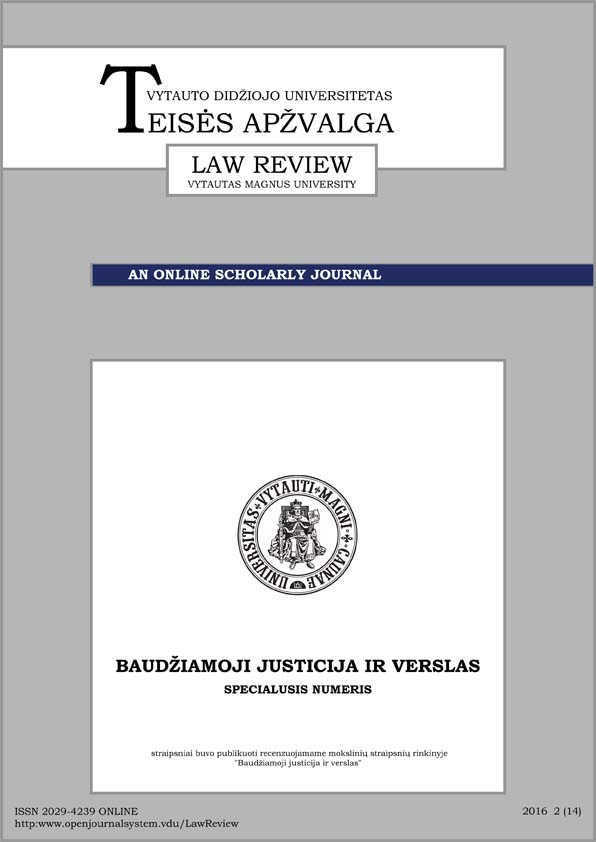Baudžiamojo proceso pažeidimu padarytos žalos atlyginimo teisinis reguliavimas ir vertinimo teismų praktikoje problematika
Problematic of Legal Regulation of Compensatory Damages Done by Infringement of Criminal Procedure and Judicial Practice Assessment
Author(s): Marijus Šalčius, Mindaugas BiliusSubject(s): Law, Constitution, Jurisprudence, Criminal Law
Published by: Vytauto Didžiojo Universitetas
Keywords: Violation of criminal procedure; Officer's unlawfull proceedings; Court's unlawfull proceedings; Damage in a criminal procedure; Legal regulation of compensatory damages
Summary/Abstract: Straipsnyje analizuojant Lietuvos Respublikos Konstitucinio Teismo bei Lietuvos Aukščiausiojo Teismo priimtus sprendimus identifikuojamos pagrindinės žalos, atsiradusios dėl ikiteisminio tyrimo pareigūnų, prokurorų, teisėjų ir teismo neteisėtų veiksmų, atlyginimo teisinio reguliavimo spragos ir siūlomi galimi jų sprendimo būdai. There are a lot of discussions about the practical problems of criminal procedure, imperfection of the rules of the Criminal Procedure Code (later in the text – Code) and so on. However, almost nobody talks about the consequences which resulted from the violation of the procedure, set in the Code. When the criminal procedure ends, pre-trial investigators, prosecutors and judges usually don’t care about the consequences of the proceedings which were announced by the court as violating the Code. Usually officers associate such violations only with their own disciplinary responsibility. But the disciplinary responsibility of the officer who was performing such actions is not the only consequence of the proceedings done when violating the Code. Based on the systemic analysis of the procedural and other legal acts, authors distinguish four main groups of the consequences of the proceedings, done when violating the Code: 1) criminal or disciplinary responsibility of the officer; 2) data, collected in the pre-trial investigation and not admitted as evidence; 3) consequences, which eliminate unlawfully collected evidences, from the further criminal procedure; 4) duty of the state to compensate the damage to the person, who suffered from the actions, announced by the court as unlawful in the proceedings. In this article, authors note that investigators and other officers usually are not informed about the court’s decisions, which are related with the concrete breaches of the Code. Such situation doesn’t allow to improve officers’ qualification, and also allows to reiterate the same procedural infringements in the future. The Constitution of the Republic of Lithuania obliges the legislator to establish legal regulation, which will guarantee compensation for the person who suffered harm in the proceedings, done when violating the Code. Performing that duty, the legislator established rules which are regulating the compensation of the mentioned harm. But the problem is that such rules are set in the three different legal acts. It can be noticed that not all of these acts are directly concerned with the criminal procedure. According to these legal acts, a person acquires the right to require the compensation only if she/he experienced the harm by the illegal temporary detention, arrest, other procedural coercive measures, or by the illegal conviction. But, according to these rules of law, the person has no right to require compensation if she/he suffered harm from the criminal procedure which lasted too long or other, not mentioned, proceedings which violated the Code. Analysis of the court‘s cases, done in this article, allows to state that such legal regulation is contrary to the international treaties and general principles of the law. For that reason authors suggest to consider a possibility to change such existing legal regulation by removing an exhaustive list of procedural infringements from the law and by providing to the person a right to require compensation in all cases if the damage to her/him was done when violating the Code.
Journal: Teisės apžvalga
- Issue Year: 2016
- Issue No: 2(14)
- Page Range: 360-376
- Page Count: 17
- Language: Lithuanian

